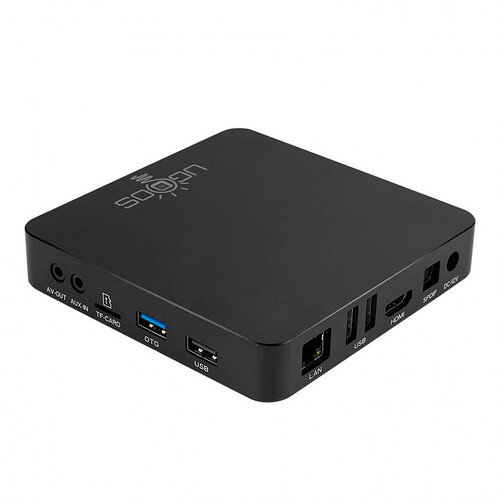Manjaro ARM 22.04 released!
We are proud to announce the release of Manjaro ARM 22.04.
You can find all our images on manjaro.org!
New Device: Ugoos AM6 Plus!
Manjaro ARM is proud to be the default installation on the Pinebook Pro and the PinePhone from Pine64.
We have put in a lot of work to get to this point and we are excited that we have been accepted by the creators of this laptop and phone, as a great OS option.
We are still working on getting great support for the Quartz64, but we will not make it part of these releases, until we have most of the stuff working.
But you can find our weekly images on Github for Quartz64-BSP, Quartz64-A and Quartz64-B and in our Manjaro ARM Flasher.
These images are currently Dev images, based on Unstable branch.
This is also the second release, where we include a Generic Aarch64 image. This image does not include any board firmware and as such requires the user to have the correct Board Firmware (like u-boot, petit-boot or tow-boot) on their boards SPI flash or any other storage that gets checked before the drive with the Generic image installed. It is using the extlinux bootloader schema. It does not support UEFI yet, but we are working on it. The download pages for the Generic image, will list the devices that we have tested to work with this image. Of course having a generic image won’t include device specific firmware (like wifi firmware) and tweaks, but those can be installed afterwards, if needed.
Application for flashing images
We have our own GUI app to make it easy for users to flash a Manjaro ARM image on to an SD card or eMMC card.
If you are on Manjaro ARM, simply install manjaro-arm-flasher and launch the app “Manjaro ARM Flasher” from your menu. This will download and flash the image of your choice.
You can also manually run the application (if you are not running Manjaro ARM) by downloading this python script, make it executable with chmod +x manjaro-arm-flasher and then run it with sudo ./manjaro-arm-flasher. It requires python-blkinfo 0.1.3 to be installed, which can be installed with pip install blkinfo.
First Time setup on Minimal edition
This release sports the First Time setup for all Minimal images, also via SSH. This means that at first boot, you will be asked about the following:
- keyboard layout (except on pinebook, that is fixed to us layout)
- username
- additional user groups (optional)
- full name
- password for that username
- password for root
- timezone
- locale
- hostname
Then the setup script will set these settings and reboot to the login screen.
Downloads:
All the download links can be found on the website
Torrents are also available!
Features:
- New packages from upstream and Manjaro ARM.
- XFCE 4.16
- KDE Plasma 5.24
- Gnome 41.5
- MATE 1.26
- Sway 1.7
- Pacman 6.0
Development images
Images for devices in development or just development (unstable) versions of supported devices can be found on our Github page.
Updating from 22.02:
- KDE Plasma edition now uses the wayland session by default.
- All our editions no longer has LibreOffice installed by default.
Known issues:
- No audio cards on Roc-CC.
- Amlogic Audio does not seem to work with Pipewire. So install
pulseudioinstead ofpipewire-pulseto get working audio on AMLogic boards
Tips and Tricks:
Smoothness on Raspberry Pi 3 devices
To get a smoother experience on your Raspberry Pi 3 device, while running the Raspberry Pi 4 image do this:
- Install
xf86-video-fbdev. - Edit
/boot/config.txtand comment outdtoverlay=vc4-fkms-v3dandmax_framebuffers=2. - Save the file and reboot.
Supported Devices:
Images:
- Khadas Vim 2
- Khadas Vim 3
- Generic Aarch64 (So far tested to work on Odroid N2(+), Pine64 LTS and Pinebook Pro, with Tow-Boot installed on SPI)
- Odroid C4
- Odroid HC4
- Odroid N2
- Odroid N2+
- Pine64-LTS
- Pine-H64
- Pinebook
- Pinebook Pro
- Radxa Zero
- Raspberry Pi 4 (tested on Model B, Raspberry Pi 3 and Raspberry Pi 400)
- Rock64
- Rock Pi 4B
- Rock Pi 4C
- RockPro64
- Ugoos AM6 Plus
With Manjaro ARM Installer (in addition to the above devices): (Download it here)
- ClockworkPI DevTerm
- Khadas Vim 1
- Khadas Edge-V Pro
- LibreComputer ROC-RK3328-CC
- NanoPC T4
- Odroid C2
- Pine64+
- Quartz64 Model A
What about other devices?
While we do make images for a lot of devices, we won’t be making images for all the supported devices. If your desired image for your desired supported device does not exist, please use manjaro-arm-installer to install it to an SD/eMMC card.
Donation
Please consider supporting Manjaro ARM directly via Patreon, Ko-Fi or Open Collective.
You can also donate to our upstream, which is Arch Linux ARM.
